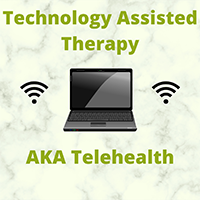Technology Assisted Therapy / Telehealth
 Quarternote Counseling offers Technology Assisted Therapy (TAT), also referred to as Telehealth. Most, but not all, insurance pays for services delivered by TAT, and some waive co-pays for services delivered by TAT during the current pandemic. If a client is interested in TAT, they might wish to call their insurance and review coverage options. Our administrative staff can also assist with this query.
Quarternote Counseling offers Technology Assisted Therapy (TAT), also referred to as Telehealth. Most, but not all, insurance pays for services delivered by TAT, and some waive co-pays for services delivered by TAT during the current pandemic. If a client is interested in TAT, they might wish to call their insurance and review coverage options. Our administrative staff can also assist with this query.
We use the HIPAA-compliant encrypted video platform Doxy.me for therapy sessions provided by video. Feel free to review the Doxy website for more information. Unlike some other platforms, Doxy.me does not require the client to download any software to their computer. The client is simply sent a website link by the therapist shortly before the first session, clicks on that link, and is automatically taken to the platform. The client enters their name in the “waiting room” box, and the therapist can “admit” them into the session at the appointed time.
A few insurances will only allow TAT (Telehealth) to be provided via another platform, such as LiveMD or TeleDoc. Quarternote therapists only provide TAT via Doxy.me, so in this case insurance unfortunately would not cover TAT.
TAT is not appropriate for all clients. Quarternote therapists will help determine if it might be a good modality for you. This determination will begin during the initial telephone screening conversation with Quarternote staff. After the initial conversation, clients interested in TAT services will be invited to come into the office for one or two sessions in order for both a standard intake and a TAT appropriateness screening to be completed. If it turns out that TAT is not an appropriate modality, we will either facilitate in-person services within Quarternote or, if that is not possible, we will seek to link the client up with appropriate services outside Quarternote.
In order to participate in TAT, the client needs to have privacy in the location they will be in at the time of the session, access to an electronic device with a camera, and a good connection with the Internet. Clients must also be in the state of Virginia during the session, due to State of Virginia Board of Counseling licensing requirements.
